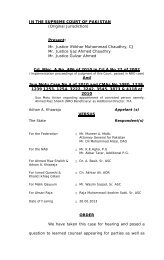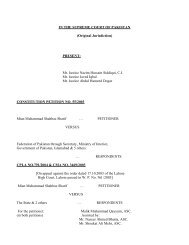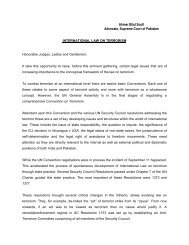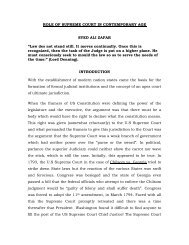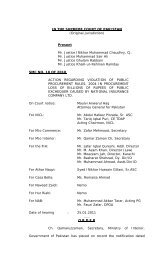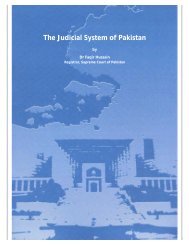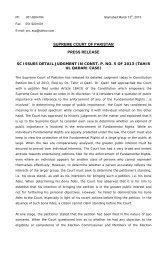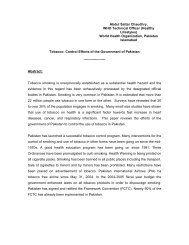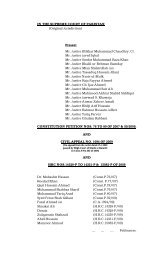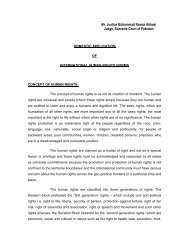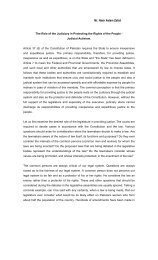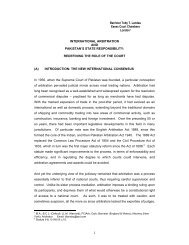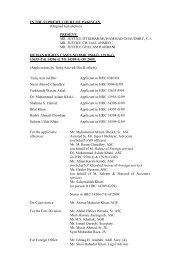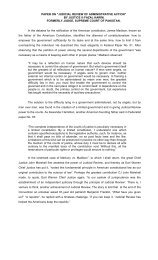mr. justice tassaduq hussain jillani mr. justice nasir-ul-mulk mr ...
mr. justice tassaduq hussain jillani mr. justice nasir-ul-mulk mr ...
mr. justice tassaduq hussain jillani mr. justice nasir-ul-mulk mr ...
You also want an ePaper? Increase the reach of your titles
YUMPU automatically turns print PDFs into web optimized ePapers that Google loves.
CIVIL APPEAL NOs. 39/2010, 1150/2010, 1162/2010, 142-K/2009, 177-<br />
K/2010, 178-K/2010, 228-K/2010, 57-K/2011, 63-K/2011, 65-K/2011, 66-<br />
K/2011, 83-K/2011, 91-K/2011, 135-K/2011, 136-K/2011, 137-K/2011, 188-<br />
K/2011, 232-K/2011, 75-K/2012 AND 82-K/2012<br />
28<br />
jurisprudence of India. The Indian Supreme Court in Ramana v.<br />
I.A. Authority of India (AIR 1979 SC 1628) adverting to the factors<br />
which make a corporation or authority an instrumentality of the<br />
State held:-<br />
“It will thus be seen that there are several factors<br />
which may have to be considered in determining<br />
whether a corporation is an agency or<br />
instrumentality of Government. We have referred<br />
to some of these factors and they may be<br />
summarized as under: Whether there is any<br />
financial assistance given by the State, and if so,<br />
what is the magnitude of such assistance<br />
whether there is any other form of assistance,<br />
given by the State, and if so, whether it is of the<br />
usual kind or it is extraordinary, whether there is<br />
any control of the management and policies of the<br />
corporation by the State and what is the nature<br />
and extent of such control, whether the<br />
corporation enjoys State conferred or State<br />
protected monopoly status and whether the<br />
functions carried out by the corporation are public<br />
functions closely related to Governmental<br />
functions. This partic<strong>ul</strong>arization relevant factors<br />
is, however, not exhaustive and by its very<br />
nature it cannot be because with increasing<br />
assumption of new tasks, growing complexities of<br />
management and administration and the<br />
necessity of continuing adjustment in relations<br />
between the corporation and Government calling<br />
for flexibility, adaptability and innovative skills, it<br />
is not possible to make an exhaustive<br />
enumeration of the tests which wo<strong>ul</strong>d invariably<br />
and in all cases provide an unfailing answer to<br />
the question whether a corporation is Government<br />
instrumentality or agency. Moreover, even<br />
amongst these factors which we have described,<br />
no one single factor will yield a satisfactory<br />
answer to the question and the Court will have to<br />
consider the cum<strong>ul</strong>ative effect of these various<br />
factors and arrive at its decision on the basis of a<br />
partic<strong>ul</strong>arized inquiry into the facts and<br />
circumstances of each case. ‘The dispositive<br />
question in any State action case’, as pointed out<br />
by Dougles, J., in Jackson v. Matropolitan Edison<br />
Co. (1974) 419 US 345 (supra) is not whether any<br />
single fact or relationship presents a sufficient<br />
degree of State involvement, but rather whether<br />
the aggregate of all relevant factors compels a<br />
finding of State responsibility. It is not enough to



